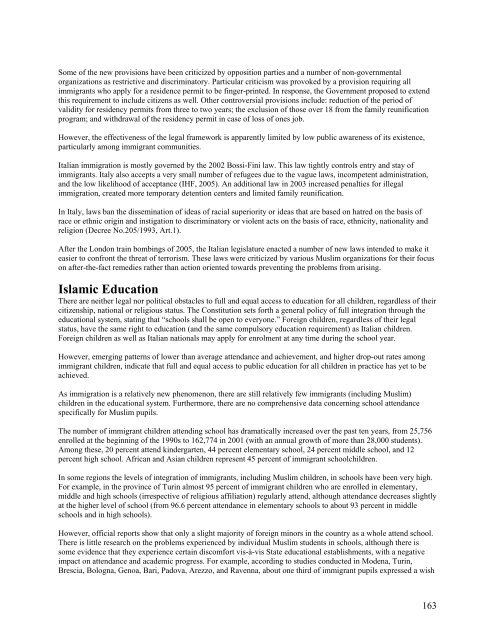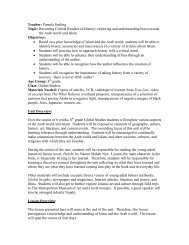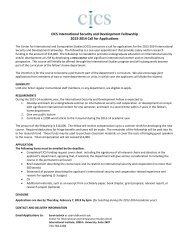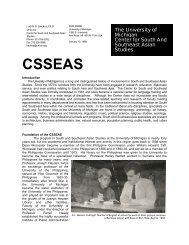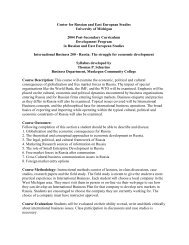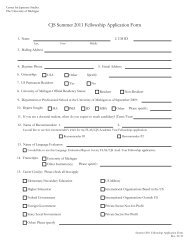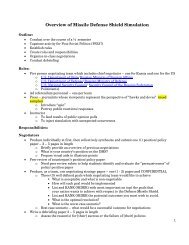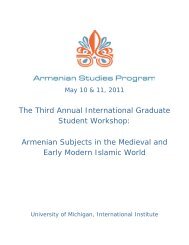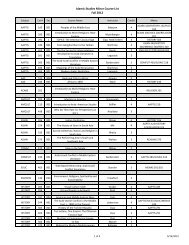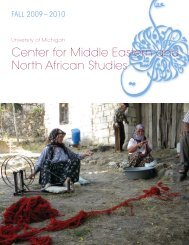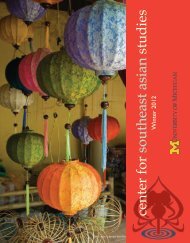Muslims in Europe: - International Institute - University of Michigan
Muslims in Europe: - International Institute - University of Michigan
Muslims in Europe: - International Institute - University of Michigan
You also want an ePaper? Increase the reach of your titles
YUMPU automatically turns print PDFs into web optimized ePapers that Google loves.
Some <strong>of</strong> the new provisions have been criticized by opposition parties and a number <strong>of</strong> non-governmental<br />
organizations as restrictive and discrim<strong>in</strong>atory. Particular criticism was provoked by a provision requir<strong>in</strong>g all<br />
immigrants who apply for a residence permit to be f<strong>in</strong>ger-pr<strong>in</strong>ted. In response, the Government proposed to extend<br />
this requirement to <strong>in</strong>clude citizens as well. Other controversial provisions <strong>in</strong>clude: reduction <strong>of</strong> the period <strong>of</strong><br />
validity for residency permits from three to two years; the exclusion <strong>of</strong> those over 18 from the family reunification<br />
program; and withdrawal <strong>of</strong> the residency permit <strong>in</strong> case <strong>of</strong> loss <strong>of</strong> ones job.<br />
However, the effectiveness <strong>of</strong> the legal framework is apparently limited by low public awareness <strong>of</strong> its existence,<br />
particularly among immigrant communities.<br />
Italian immigration is mostly governed by the 2002 Bossi-F<strong>in</strong>i law. This law tightly controls entry and stay <strong>of</strong><br />
immigrants. Italy also accepts a very small number <strong>of</strong> refugees due to the vague laws, <strong>in</strong>competent adm<strong>in</strong>istration,<br />
and the low likelihood <strong>of</strong> acceptance (IHF, 2005). An additional law <strong>in</strong> 2003 <strong>in</strong>creased penalties for illegal<br />
immigration, created more temporary detention centers and limited family reunification.<br />
In Italy, laws ban the dissem<strong>in</strong>ation <strong>of</strong> ideas <strong>of</strong> racial superiority or ideas that are based on hatred on the basis <strong>of</strong><br />
race or ethnic orig<strong>in</strong> and <strong>in</strong>stigation to discrim<strong>in</strong>atory or violent acts on the basis <strong>of</strong> race, ethnicity, nationality and<br />
religion (Decree No.205/1993, Art.1).<br />
After the London tra<strong>in</strong> bomb<strong>in</strong>gs <strong>of</strong> 2005, the Italian legislature enacted a number <strong>of</strong> new laws <strong>in</strong>tended to make it<br />
easier to confront the threat <strong>of</strong> terrorism. These laws were criticized by various Muslim organizations for their focus<br />
on after-the-fact remedies rather than action oriented towards prevent<strong>in</strong>g the problems from aris<strong>in</strong>g.<br />
Islamic Education<br />
There are neither legal nor political obstacles to full and equal access to education for all children, regardless <strong>of</strong> their<br />
citizenship, national or religious status. The Constitution sets forth a general policy <strong>of</strong> full <strong>in</strong>tegration through the<br />
educational system, stat<strong>in</strong>g that “schools shall be open to everyone.” Foreign children, regardless <strong>of</strong> their legal<br />
status, have the same right to education (and the same compulsory education requirement) as Italian children.<br />
Foreign children as well as Italian nationals may apply for enrolment at any time dur<strong>in</strong>g the school year.<br />
However, emerg<strong>in</strong>g patterns <strong>of</strong> lower than average attendance and achievement, and higher drop-out rates among<br />
immigrant children, <strong>in</strong>dicate that full and equal access to public education for all children <strong>in</strong> practice has yet to be<br />
achieved.<br />
As immigration is a relatively new phenomenon, there are still relatively few immigrants (<strong>in</strong>clud<strong>in</strong>g Muslim)<br />
children <strong>in</strong> the educational system. Furthermore, there are no comprehensive data concern<strong>in</strong>g school attendance<br />
specifically for Muslim pupils.<br />
The number <strong>of</strong> immigrant children attend<strong>in</strong>g school has dramatically <strong>in</strong>creased over the past ten years, from 25,756<br />
enrolled at the beg<strong>in</strong>n<strong>in</strong>g <strong>of</strong> the 1990s to 162,774 <strong>in</strong> 2001 (with an annual growth <strong>of</strong> more than 28,000 students).<br />
Among these, 20 percent attend k<strong>in</strong>dergarten, 44 percent elementary school, 24 percent middle school, and 12<br />
percent high school. African and Asian children represent 45 percent <strong>of</strong> immigrant schoolchildren.<br />
In some regions the levels <strong>of</strong> <strong>in</strong>tegration <strong>of</strong> immigrants, <strong>in</strong>clud<strong>in</strong>g Muslim children, <strong>in</strong> schools have been very high.<br />
For example, <strong>in</strong> the prov<strong>in</strong>ce <strong>of</strong> Tur<strong>in</strong> almost 95 percent <strong>of</strong> immigrant children who are enrolled <strong>in</strong> elementary,<br />
middle and high schools (irrespective <strong>of</strong> religious affiliation) regularly attend, although attendance decreases slightly<br />
at the higher level <strong>of</strong> school (from 96.6 percent attendance <strong>in</strong> elementary schools to about 93 percent <strong>in</strong> middle<br />
schools and <strong>in</strong> high schools).<br />
However, <strong>of</strong>ficial reports show that only a slight majority <strong>of</strong> foreign m<strong>in</strong>ors <strong>in</strong> the country as a whole attend school.<br />
There is little research on the problems experienced by <strong>in</strong>dividual Muslim students <strong>in</strong> schools, although there is<br />
some evidence that they experience certa<strong>in</strong> discomfort vis-à-vis State educational establishments, with a negative<br />
impact on attendance and academic progress. For example, accord<strong>in</strong>g to studies conducted <strong>in</strong> Modena, Tur<strong>in</strong>,<br />
Brescia, Bologna, Genoa, Bari, Padova, Arezzo, and Ravenna, about one third <strong>of</strong> immigrant pupils expressed a wish<br />
163


